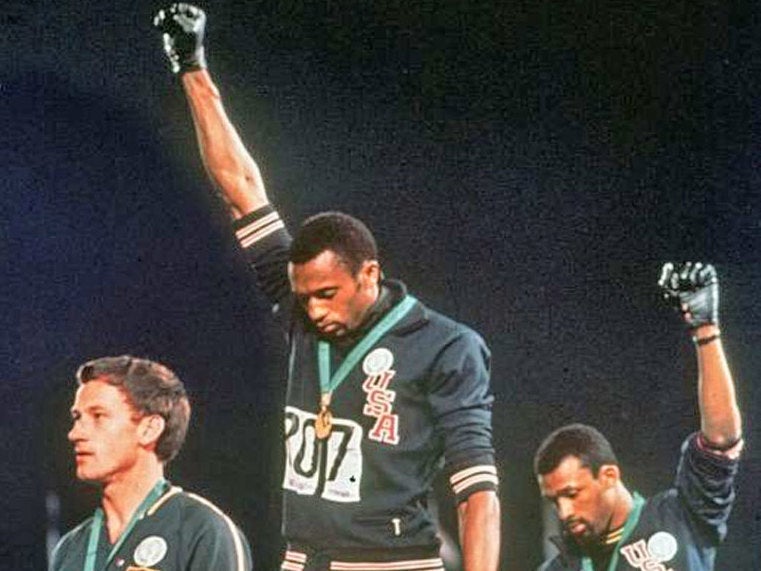Black Power salute 50 years on: Iconic Olympics protest by Tommie Smith and John Carlos remembered
As the American national anthem played during the victory ceremony, the athletes bowed their heads and raised their black-gloved fists

Your support helps us to tell the story
From reproductive rights to climate change to Big Tech, The Independent is on the ground when the story is developing. Whether it's investigating the financials of Elon Musk's pro-Trump PAC or producing our latest documentary, 'The A Word', which shines a light on the American women fighting for reproductive rights, we know how important it is to parse out the facts from the messaging.
At such a critical moment in US history, we need reporters on the ground. Your donation allows us to keep sending journalists to speak to both sides of the story.
The Independent is trusted by Americans across the entire political spectrum. And unlike many other quality news outlets, we choose not to lock Americans out of our reporting and analysis with paywalls. We believe quality journalism should be available to everyone, paid for by those who can afford it.
Your support makes all the difference.It remains one of the most memorable moments in Olympic history. Standing on the podium at the 1968 Games in Mexico City, American sprinters Tommie Smith and John Carlos raised their fists to make the Black Power salute, a symbol of defiance against racism and injustice.
The silent protest, which took place 50 years ago yesterday, was initially condemned by the International Olympic Committee but is now seen as a watershed moment in the battle for equality. The demonstration came at a time of major social upheaval; Martin Luther King Jr, the figurehead of the civil rights movement, was assassinated just six months earlier.
Who are Tommie Smith and John Carlos?
Tommie Smith, who performed the Black Power salute alongside John Carlos, won the gold medal for the 200-metre sprint event at the 1968 Olympics. Smith completed the race in just 19.83 seconds, breaking his own world record. His US teammate Mr Carlos finished third with a time of 20.06 seconds, while Australian athlete Peter Norman took the silver medal.
As the American national anthem played during the victory ceremony, Mr Smith and Mr Carlos bowed their heads and raised their black-gloved fists. The pair both wore black socks and no shoes, in memory of black people who had been lynched, while Mr Carlos wore a necklace of black beads.
“I looked at my feet in my high socks and thought about all the black poverty I’d seen from Harlem to East Texas,” Mr Carlos, who is now 74, would later write in his autobiography. “I fingered my beads and thought about the pictures I’d seen of the ‘strange fruit’ swinging from the poplar trees of the South.”
Speaking earlier this year, Mr Smith said he wanted to use his platform to make a powerful statement about racial equality. “I knew it [the salute] would have an impact but I didn’t know how far it would go,” he told Reuters. “That was my chance. I had a platform.”
The former athletes have both been inducted into the US Track and Field Hall of Fame.
Who was Peter Norman?
Australian sprinter Peter Norman, who finished second, wore a human rights badge on the podium in support of Mr Smith and Mr Carlos. After the Games, he said: “I believe that every man is born equal and should be treated that way.”
In a 2012 interview, Mr Smith reflected: “Peter was a man in his own right… Peter backed himself. He did not need Tommie Smith and John Carlos to believe in what he did. He just happened to be blessed to be on the victory stand with two people who believed in what he did. And that was the power of that human rights stand in Mexico City in 1968 – togetherness.”
Mr Norman died following a heart attack in 2006, aged 64. Both Mr Smith and Mr Carlos gave eulogies and were pall-bearers at his funeral.

How did people respond to the Black Power salute?
The International Olympic Committee condemned Mr Smith and Mr Carlos’ protest, deeming it a political statement and “a deliberate and violent breach of the fundamental principles of the Olympic spirit”.
The US athletes were promptly suspended from their country’s Olympic team and sent home, where they received death threats and hate mail. Both men were widely vilified and struggled for years to make a living.
Time magazine called the protest a “public display of petulance that sparked one of the most unpleasant controversies in Olympic history”, adding: “’Faster, Higher, Stronger’ is the motto of the Olympic Games. ‘Angrier, nastier, uglier’ better describes the scene in Mexico City last week.”
However, the blacked-glove fist has since become an enduring symbol of the fight for racial equality and justice. Mr Smith said he believes that there is much broader support for non-violent protest nowadays than in 1968. Pointing to the success of the Black Lives Matter and #MeToo movements, he said: “Things are getting bigger and better and, if one doesn’t watch out, control [of protests] will be very, very difficult.”
Join our commenting forum
Join thought-provoking conversations, follow other Independent readers and see their replies
Comments